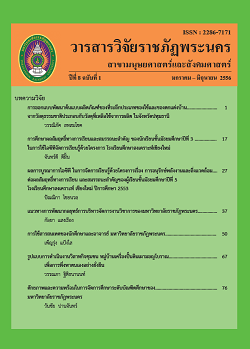รูปแบบโรงเรียนต้นแบบสืบสานการเรียนรู้ภูมิปัญญาท้องถิ่น ตามวิถีเศรษฐกิจพอเพียง เพื่อการพัฒนาชุมชน : กรณีศึกษาพื้นที่ บางกะเจ้า อำเภอพระประแดง จังหวัดสมุทรปราการ
Main Article Content
Abstract
ผลการวิจัยพบว่า
1. สภาพการดำเนินการในโรงเรียนที่เกี่ยวกับภูมิปัญญาท้องถิ่นตามวิถีเศรษฐกิจพอเพียง โรงเรียน ได้นำองค์ความรู้ ภูมิปัญญาท้องถิ่นมาพิจารณาจัดกิจกรรมการเรียนการสอน ปลูกจิตสำนึกให้นักเรียนรู้คุณค่า อนุรักษ์ทรัพยากรธรรมชาติ ภูมิใจในภูมิปัญญาท้องถิ่น โดยคำนึงถึงความเหมาะสมของทรัพยากรท้องถิ่น กับสภาพสังคมปัจจุบัน
2. ปัจจัยการขับเคลื่อนการพัฒนาภูมิปัญญาท้องถิ่นตามวิถีเศรษฐกิจพอเพียงที่โรงเรียนประสบ ความสำเร็จ ปัจจัยภายในชุมชน ได้แก่ ภาวะผู้นำของผู้บริหาร การบริหารจัดการการเรียนการสอน การติดต่อ ประสานความร่วมมือกับหน่วยงานภายนอก การมีส่วนร่วมของนักเรียนและปราชญ์ท้องถิ่น ปัจจัยภายนอก ชุมชน ได้แก่ เครือข่ายความร่วมมือ และการมีส่วนร่วมขององค์กร หน่วยงานภาครัฐและภาคเอกชน
3. รูปแบบการดำเนินงานของโรงเรียนต้นแบบสืบสานการเรียนรู้ภูมิปัญญาท้องถิ่นตามวิถีเศรษฐกิจ พอเพียง มีดังนี้ 1) ผู้บริหาร ครู เป็นตัวจักรสำคัญในการขับเคลื่อน ดำเนินงานเป็นขั้นตอน 2) บุคลากรของ โรงเรียนมีความรู้เรื่องปรัชญาเศรษฐกิจพอเพียง 3) เน้นการนำภูมิปัญญาท้องถิ่นประยุกต์เข้ากับหลักปรัชญา เศรษฐกิจพอเพียง 4) องค์ความรู้ ภูมิปัญญาท้องถิ่นที่นักเรียนได้รับมีความเหมาะสมกับวัฒนธรรมและ ทรัพยากรของท้องถิ่น 5) การมีส่วนร่วมของบุคลากร / หน่วยงานภายในและภายนอกชุมชน 6) บุคลากรของ โรงเรียนมีความเห็นพ้องต้องกันกับรูปแบบของโรงเรียนต้นแบบ
School Model on the Continuation of Local Wisdom Learning in Accordance with Sufficiency Economy for Community Deveiopment: A Case Study on Bang Kachao Area, Phrapradaeng District, Samutprakan Province
The objectives of this research were 1) to study the condition of school management concerning the local wisdom in accordance with Sufficiency Economy, 2) to study factors propelling local wisdom development in accordance with Sufficiency Economy, 3) to study prototype of the school model on the continuation of local wisdom learning in accordance with Sufficiency Economy. In this study, the qualitative research was applied. The collected data derived from 3 population groups: 33 executives/teachers, 55 students, and 18 local intellectuals by interview and group discussion methods and in turn were analyzed by context analysis.
The research results revealed that:
1. For the conditions of school management concerning the local wisdom Sufficiency Economy; the school determined to local wisdom for learning and teaching activities, encouraging students to respect and conserve natural resources and be proud of the local wisdom in responed to local resources suitability and present social condition.
2. As for the factors propelling local wisdom development in accordance with Sufficiency Economy for the school achievement, internal factors were executives’ leadership, instructional administration, the collaboration with external organizations and the participation of students and local intellectuals. External factors were networks and the participation of organizations, the government, and the private sector.
3. The school model on the continuation of local wisdom in accordance with Sufficiency Economy were characterized as follows: 1) Executives and teachers were key factor local wisdom and sufficiency economy were management, 2) School personnel clearly understood Sufficiency Economy, 3) Emphasized on local wisdom application to Sufficiency Economy principles, 4) Local wisdom students learned was suitable to local culture and resources, 5) personnel and organizations within both inside and outside the community got involved, 6) school personnel agreed with the school model.
Article Details
Each publish articles were copyright by Phranakorn Rajabhat University
Any contents which appeared in each articles in the journal were authors personal opinion. It did not relate to Phranakorn Rajabhat University and other instructors in the university. Each authors would take responsibility on their articles. If there are any mistake, the authors will take responsibility themselves


